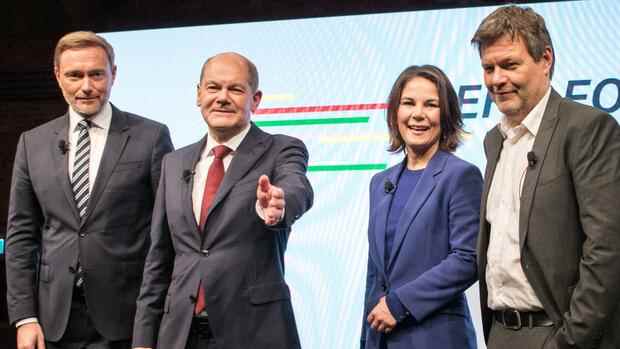The traffic light partners now have to prove that they have more in common than the mere will to power.
(Photo: imago images/image enclosure)
A new phase of cooperation is just beginning for the traffic lights. After the magic of the beginning had worn off and then the turmoil of war had welded the three coalition partners together, the internal conflicts that had been involved in the formation of a government became apparent as the war went on. The distribution fight in the traffic light has flared up openly.
For the grand coalition money was the coalition cement, the cement for the traffic lights is the joint desire of all three government partners to see the Union on the opposition bench. However, because in the end everything comes down to money, this goal that has already been achieved will not be enough for successful government in the long run.
The traffic light partners now have to prove that they have more in common than the mere will to power. But after the past few days, there is considerable doubt about that.
There is now little to be seen of the Scholz/Lindner axis, instead Red-Green is increasingly pushing the FDP against the wall. Ever since the SPD’s manageable government work has been reflected in declining polls and electoral defeats, the Social Democrats have been pushing forward with new proposals almost daily, with their old fickleness.
Top jobs of the day
Find the best jobs now and
be notified by email.
First, Social Affairs Minister Heil wants to misappropriate the climate money as one of the few climate policy instruments for socio-political purposes. Then SPD leader Lars Klingbeil, in a duet with the Greens, struck up the melody of an excess profit tax for companies. Knowing full well that this proposal is an impertinence for the FDP.
>> Read here: Green boss demands climate money with control effect
Even if drivers at the petrol pump have moderate tantrums when they think that every extra euro that hurts them makes the tills ring at BP, Shell and Co. – the proposal has too many pitfalls to be implemented.
The delimitation difficulties are far too great, a special tax threatens to lead to unequal tax treatment and even arbitrariness. The negative signal effect for the location should not be underestimated either: Corporate taxes in Germany are already among the highest in the world.
Moreover, the proposal is not consistent either: Anyone who wants to ask those who have won the crisis to pay up would also have to fleece the groups that have come through the pandemic best, such as pensioners and civil servants, after Corona.
However, the tax does have a core of truth: Instead of constantly creating new financial vehicles, tax increases would be the more honest way to cover the costs of climate change and the turn of the century. But then in width.
More: Debate about special tax: Should the state skim off the billions in profits from the oil companies?
